|
Trail riding tips
Safety Guidelines for Horseback Riding on the Trails
There are many trail riding tips to consider in order to be safe while horseback riding or driving a horse. It is very important to perform a safety check of your horse, tack, and condition of the trail before starting out on your ride or drive.
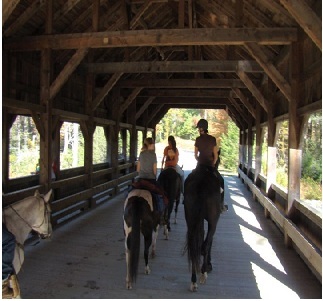
Trail Riding Tips
•Cell phones are a great safety tool on the trail, however they do not always have dependable signals when riding in remote areas. If a cell phone is not operable, you may want to invest in some long-range walkie-talkies. If alone, always leave the park station with your emergency contacts, as well as departure and expected arrival times.
•Travel with a map and compass. Stay on the marked trail when possible, avoiding switchbacks and fire lanes. Carry a flash light in case nightfall catches you still on the trail.
•Travel with both horse and human first aid kits. Include insect repellant, ointments for cuts and sunburns, bandages, and a set of hoof pliers to remove loose shoes. If you have any allergies or illnesses, notify others in your riding group.
•It is best not to ride alone. If you do, tell someone where you are going, and what time you expect to be back. Consider carrying a cell phone to use in case of an emergency.
•Consider attaching an ID tag to your horse when trail riding. The tag should include the horse’s name, your name, and your cell phone number. Should you become separated from your horse and you are some distance from home, a cell phone number will aid anyone who has caught your horse in reuniting it with you.
•Carry a current map of the area and have an idea where you are going. Study the area around you, noting landmarks. Occasionally look behind you to help recognize the trail for your return. Some riders find a GPS (Global Positioning System) unit to be helpful in keeping track of where they have ridden.
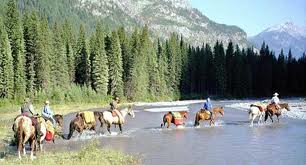
•Stay on designated/marked trails. Do not ride horses at a pace greater than a walk on muddy trails. You should cross rivers, creeks, or wetland only in designated areas to guard against adverse impact on the environment and for the safety of you and your horse. Good riding etiquette prevents land abuse and destruction. If you ride on federal or state lands, ask the park officials for their advice on the best trails to take or if there are any map changes. Ride only on lands offered for public or private use where you have permission to ride.
When riding in hot weather, continually monitor your horses for signs of heat stress. If the horse is breathing rapidly or has stopped sweating, search for a shady spot. Take off the horse's saddle and sponge the horse's face, neck, chest and back with water. Try offering the horse something to drink and let the horse rest until recovery is evident. The horse may require additional treatment for dehydration and electrolyte loss.
Suggested List of Items to Bring on a Trail Ride
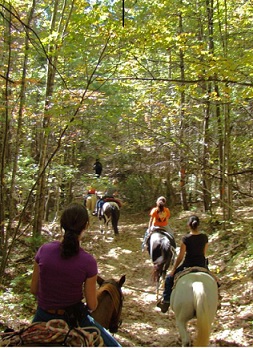
1.Current health papers and Coggins test
2.Hoof pick
3.Sharp knife and/or all-in-one pocket tool
4.Lip balm
5.A form of identification
6.Sunscreen and insect Repellent
7.First aid kits for horses and riders
8.Tissues or toilet paper
9.String or leather for tack repair
10.Snacks/Water
11.Compass
12.Rain gear/jacket/Gloves
Source - Jen Nadeau, trail riding tips B. Greene, trail riding tips
|
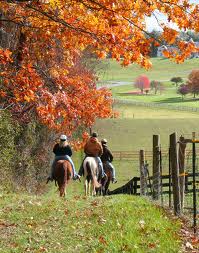 •If your horse goes lame on the trail, dismount immediately and check the hooves for a rock or the legs for an abrasion. If the horse can proceed, lead the horse to the next nearest loading site and call for help.
•If your horse goes lame on the trail, dismount immediately and check the hooves for a rock or the legs for an abrasion. If the horse can proceed, lead the horse to the next nearest loading site and call for help.
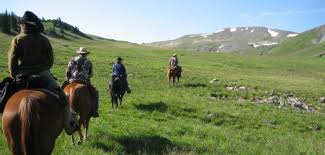 Hot Weather
Hot Weather
